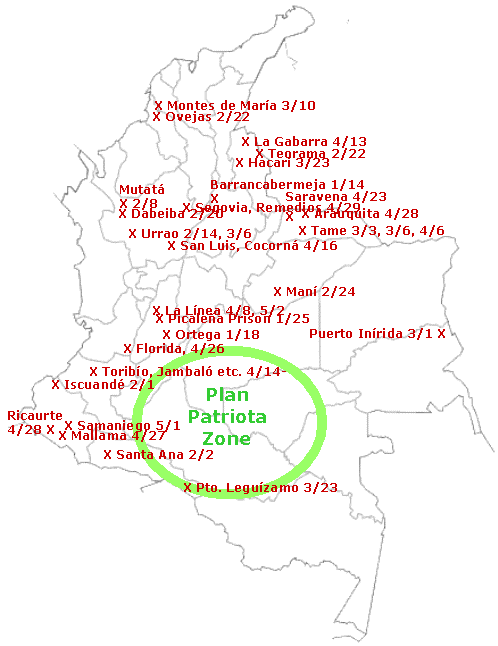« A defense minister's bad week | Main | Trafficking arms to "a friend of a friend" »
May 03, 2005
Beyond Plan Patriota
Today’s El Tiempo features a very in-depth series of articles about “Plan Patriota,” the U.S.-supported military offensive in southern Colombia, involving nearly 20,000 troops, that began in early 2004. If you read Spanish, the articles are definitely worth a look. They offer much new information.
On El Tiempo’s “Conflicto Armado” page today, right next to the Plan Patriota series, is a link to coverage of yesterday’s FARC attack on “La Línea,” the pass through the Andes in Tolima that links Bogotá to Cali. Three policemen and a civilian were killed.
Tolima, of course, is not in the Plan Patriota zone of operations. Nor is northern Cauca, where the FARC have carried out a string of attacks on indigenous towns since mid-April. Nor are Nariño and Arauca, where the FARC have hit military targets several times in recent months.
While combat is no doubt constant in the Plan Patriota zone, little information about these FARC-military confrontations is being made public. What we do know is that the dramatic escalation in guerrilla attacks of the past few months is being felt, strongly, outside the area where Plan Patriota is taking place.
Here is a rough map, based on press coverage, sketching out some of the more significant incidents of combat between the FARC and the Colombian security forces so far this year. Though schematic, it shows that while the FARC is being pressured within their longtime southern stronghold, they are emerging from their two-year “tactical retreat” by launching attacks throughout the length and breadth of Colombia’s national territory.

This is very bad news, both for the Uribe government’s security strategy and for anyone who wants to see the killing come to an end. It also casts strong doubt on one of the El Tiempo series’ too-optimistic claims, that “both the government and the FARC recognize that the current moment is the beginning of the end of the war.” That’s far from certain, though the war is certainly entering a new phase.
(The map includes only confrontations between guerrillas and security forces. It doesn’t include confrontations between guerrillas and paramilitaries, such as the ongoing violence in southern Bolívar and the Atrato River region of Chocó. It doesn’t include guerrilla attacks on civilians, such as the bombing of RCN studios in Cali, the murders of councilmembers in Caquetá and Huila, and many others. Some dates are approximate.)
----------------
Quote of the week:
"We're not interested in anything like that. The dividing line is clear: between those who are democratic and those who are anti-democratic, between those of us who defend the Constitution and those who would do away with it. In this second group are - with varying interests - Uribe, the paramilitaries and the FARC." - Representative (and former M-19 guerrilla) Gustavo Petro, responding to the FARC's call to join forces against President Uribe's re-election.
Posted by isacson at May 3, 2005 02:44 PM
Trackback Pings
TrackBack URL for this entry:
http://ciponline.org/cgi-bin/mt-tb.cgi/82
Comments
The articles are indeed very interesting for those interested in the subject. I'd agree that talking about the "beginning of the end" is far from certain right now, in practice, but it does partially reflect the apparent opinion of both the FARC and the government, currently (or at least it reflects both of their public positions, even if just for their mutual propaganda/rhetoric purposes).
In the particular case of the FARC, I have a feeling that, among what they call their "lessons" from the Vietnamese experience, they are thinking about launching some sort of Tet Offensive when they speak of a so-called "final offensive", even if this may or may not be reflected by current events on the ground.
What FARC may seem to be doing right could be:
-Trying to prove that Plan Patriota has, in their words, "failed" because they are still active and can still attack any targets of their choosing.
-Challenging Colombia's public and political opinion, in order to force them to demand a reduction in the military weight currently present in the Plan Patriota zone, in order to protect other areas. Even if most of the FARC has endured the Plan's effects with relatively few problems, a number of their commanders and men must definitely be feeling a lot more pressure than they are used to. If they ever want to launch a "final offensive", they'd need the extra time, rest and space that such a government change/retreat could afford them.
Posted by: jcg at May 4, 2005 02:25 AM
Post a comment
Thanks for signing in, . Now you can comment. (sign out)
(If you haven't left a comment here before, you may need to be approved by the site owner before your comment will appear. Until then, it won't appear on the entry. Thanks for waiting.)